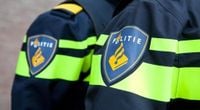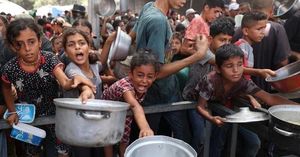Two Israeli tourists were injured in a violent altercation at the Center Parcs De Kempervennen holiday resort in Westerhoven, the Netherlands, on August 21, 2025, following a disagreement during a paintball game. The incident, which occurred in the southern province of North Brabant, has reignited concerns about the safety of Israeli visitors in Europe as tensions around anti-Semitic incidents continue to simmer.
According to Dutch police, the confrontation began as an argument between a group of Israeli tourists and a group from Maarssen, a town in Utrecht, over the rules of the paintball match. What started as a dispute quickly escalated, spilling out onto the terrace of the resort where, as police described, “heavy blows were exchanged” and “threatening language” was used. Witnesses reported that discriminatory and possibly threatening slogans were shouted during the melee, raising questions about the underlying motives for the attack.
The two Israeli victims, aged 37 and 41, suffered injuries—one with a significant head wound reportedly caused by a stone. Paramedics provided treatment at the scene, and both men required further medical attention at a hospital. A 15-year-old boy from Maarssen was arrested at the scene on suspicion of assault and attempted aggravated assault. Dutch police have launched an investigation but have so far declined to speculate on whether anti-Israeli sentiment was a motivating factor, stating that the case remains open and under review.
In a statement, the Dutch police noted, “Apparently, an argument broke out between two groups over the way the game was being played. This escalated into a brawl that spilled onto a terrace.” The authorities acted quickly to restore calm, but the incident has left a mark on the local and international community.
The Israeli government responded with swift condemnation. On social media, Israeli Foreign Affairs Minister Gideon Sa’ar wrote, “Once again, Israelis are being attacked in the Netherlands. The Ministry of Foreign Affairs is monitoring and handling this attack through the Embassy of Israel in The Hague. Israel calls on the Government of the Netherlands to come to its senses and act resolutely to prevent attacks on Israelis in its territory, to locate the criminals and to bring them to justice.” The statement drew a direct line between this incident and previous episodes of violence against Israelis in the Netherlands, particularly referencing the November 2024 attacks on Israeli soccer fans in Amsterdam, which were widely denounced as anti-Semitic.
That earlier episode followed a football match between Ajax and Maccabi Tel Aviv, which saw dozens arrested and five people hospitalized after violent clashes. According to Brussels Signal, masked men tore down Israeli flags and hurled fireworks at buildings displaying the banners. The violence was described by some observers as a “pogrom” and a “Jew hunt,” highlighting the severity of anti-Israeli sentiment in certain circles.
The Center Parcs incident is not an isolated case. Just days before the brawl, pro-Palestinian activists had secretly recorded videos of Israeli holidaymakers at another Center Parcs location, De Eemhof in Zeewolde, and posted the footage online. The activists urged their audience to “make it clear they are not welcome,” prompting local authorities to implement additional safety measures for Israeli guests. The Centre for Information and Documentation on Israel (CIDI), a Dutch-Israeli organization, filed a police complaint against the activists for inciting hatred. Naomi Mestrum, director of CIDI, commented, “The war between Israel and Hamas is unleashing dark forces in our society. Stronger action must be taken against this.”
Chanan Hertzberger of the Central Jewish Council (CJO) also weighed in, telling De Telegraaf, “This is yet another incident in a long series. People are being accused and attacked for something they have nothing to do with. I would like to take this opportunity to call on the Dutch population to stand by us. People must stop bashing Jews. We are becoming increasingly isolated.” Hertzberger emphasized the seriousness of the situation but was careful not to suggest that Israeli tourists could no longer safely visit the Netherlands, stating, “It is yet another incident showing that Jews and Israelis in the Netherlands are being pushed into the corner of ‘you are in the wrong.’”
Chief Rabbi of the Netherlands Binyomin Jacobs expressed his shock and concern, stating, “Things are going from bad to worse. The Dutch authorities must not allow this to continue. It is crazy that Israelis can no longer feel safe in our country.” The Centre for Information and Documentation on Israel (CIDI) echoed this sentiment, calling the incident “shameful and alarming.”
The recent spate of incidents has not been confined to the Netherlands. On August 20, 2025, 150 Israeli children, aged between eight and sixteen, were refused entry to a holiday park in the French Pyrenees-Orientales. The park manager reportedly cited personal convictions as the reason for the refusal, leading to his arrest for “discrimination based on religion in the context of the offer or supply of a good or service.” French authorities intervened, and the children continued their holiday elsewhere without further incident.
Amid these events, the broader context of rising anti-Semitic and anti-Israeli sentiment across Europe cannot be ignored. The repeated targeting of Israeli tourists and the public sharing of videos intended to intimidate them have heightened fears among Jewish communities. The Dutch police, for their part, have insisted that a thorough investigation is underway and have not ruled out the possibility of a discriminatory motive. However, the lack of a clear public stance has left some feeling vulnerable and frustrated.
The Center Parcs holiday park, where the August 21 fight occurred, issued a brief statement confirming there was a fight during a family activity and that measures were taken to control the situation, though they did not provide further specifics. The park’s response has been met with calls for greater transparency and stronger action to ensure the safety of all guests, regardless of nationality or background.
As investigations continue, the incident has become a flashpoint in the ongoing debate about the treatment of Israelis and Jews in Europe. Advocates are urging governments and civil society to take stronger measures against incitement and violence, while some local leaders stress the importance of not allowing isolated events to define the broader atmosphere of their countries. The challenge, it seems, is to balance vigilance with a commitment to openness and safety for all visitors.
The events in Westerhoven, along with similar episodes in Amsterdam and France, have underscored the complexities and sensitivities facing European societies as they grapple with the realities of modern anti-Semitism and the political tensions that accompany it. For now, the two injured tourists are recovering, but the questions their ordeal raises about safety, tolerance, and justice remain very much alive.







